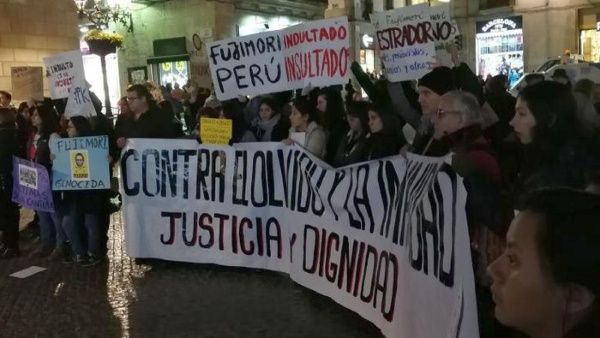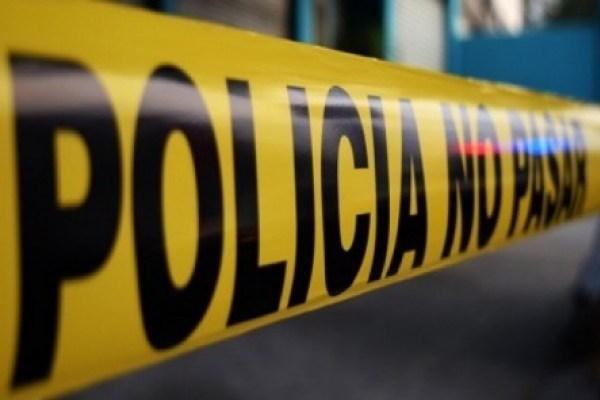International
Trial of former president Fujimori for massacre begins in Peru

December 19 |
The trial against former Peruvian president Alberto Fujimori, his former advisor Vladimiro Montesinos and 21 others investigated for the crime of aggravated homicide in the Pativilca massacre case began this Monday, according to local judicial sources.
According to the information, the hearing will be in charge of the Fourth National Superior Criminal Court.
At the beginning of the trial, Public Prosecutor Elsa Delgado Pérez stated that former president Alberto Fujimori (1990-2000) implemented an anti-terrorist policy that consisted of “eliminating presumed terrorist elements” through operations carried out by the Colina undercover detachment.
The Public Prosecutor explained that Fujimori developed this national policy with the issuance of new laws and the organization of the National Intelligence Service (SIN), through which he ordered special intelligence operations related to the fight against terrorism in the country.
“One of those operations was carried out by the Colina detachment,” which “assassinated six residents” of Pativilca, north of Lima, on Jan. 29, 1992, and proposed the appointment of trusted personnel in those entities of the Armed Forces, Delgado said.
According to the Public Prosecutor’s accusation, Colina is the undercover military group that was also responsible for the Barrios Altos and La Cantuta massacres, for which Fujimori was sentenced to 25 years in prison in 2009, but now the former president is following this trial in freedom, after his pardon was reinstated this year.
However, the Public Prosecutor’s Office previously requested the preliminary detention of the former president and a new sentence of 25 years in prison, considering that crimes against humanity have been committed.
The former president was remotely connected to the hearing from his daughter Keiko’s house in Lima, accompanied by his lawyer, and his former intelligence advisor Vladimiro Montesinos was also connected from the Callao Naval Base, former military chiefs and the former members of Colina from the prisons where they are being held for having sentences in force, all of whom are involved in this trial for homicide, murder and forced disappearance.
In the case of Montesinos, the representative of the Public Prosecutor’s Office affirmed that he was the “de facto head of the SIN”, since he shared control of this entity with its director, Julio Salazar Monroe, and was in charge of designing “a policy of eliminating presumed terrorist elements”.
He was the one “in charge of implementing the illegal fight against terrorism, through these illegal operations,” orders that were carried out by the Colina detachment, he specified.
“He ordered, with Alberto Fujimori’s knowledge and consent, that Colina carry out this intelligence operation aimed at eliminating alleged terrorist elements,” said Delgado in his accusation against the defendants.
International
Football Fan Killed in Clashes After Colombian League Match

Fans of Cúcuta Deportivo and their traditional rivals Atlético Bucaramanga clashed outside the stadium following their local league match on Tuesday, leaving one supporter dead and several others injured.
The deceased fan was stabbed, according to a senior police official in Cúcuta who confirmed the cause of death in a video statement. Local media reported that the victim was a supporter of the visiting team, Atlético Bucaramanga.
The match ended in a 2-2 draw. Authorities had banned the entry of Atlético Bucaramanga’s organized supporters into the stadium in an effort to prevent disturbances.
Despite the restrictions, violence broke out in the surrounding areas after the game. Among the injured were three police officers, an institutional source told AFP.
The incident adds to a series of recent violent episodes linked to Colombian football. The most recent occurred in December, when supporters of Atlético Nacional and Independiente Medellín clashed in the stands and on the pitch, leaving 59 people injured.
International
Missing Spanish Sailor Rescued After 11 Days Adrift in Mediterranean

The man had departed from the port of Gandía, on Spain’s eastern coast, with the intention of reaching the southern Spanish town of Guardamar del Segura, a journey of about 150 kilometers, a spokesperson for Spain’s maritime rescue service told AFP.
Search boats and aircraft were deployed on January 17, but the operation was called off on January 22 after efforts proved unsuccessful. Alerts were then issued to vessels navigating the area in case they spotted any signs of the missing sailor.
As hopes were fading, a surveillance aircraft from the European Union’s border agency Frontex spotted the sailboat on Tuesday, along with a person signaling for help, approximately 53 nautical miles northeast of Bejaia, Algeria.
A nearby vessel, the Singapore-flagged bulk carrier Thor Confidence, carried out the rescue and is expected to bring the man to an end to his ordeal when it arrives on Thursday in the southern Spanish port city of Algeciras.
Maritime rescue services shared images on social media showing a small white sailboat drifting at sea and secured alongside the much larger ship.
It remains unclear how the sailboat ended up hundreds of kilometers off its intended route or how the man managed to survive for so long alone in open waters.
International
Rubio Says U.S. Could Participate in Follow-Up Russia-Ukraine Talks

The United States could join a new round of talks this week aimed at ending Russia’s invasion of Ukraine, Secretary of State Marco Rubio said on Tuesday.
Teams from Kyiv and Moscow met last Friday and Saturday in Abu Dhabi in their first publicly acknowledged direct negotiations to discuss the peace initiative promoted by former U.S. President Donald Trump.
“They are going to hold follow-up talks again this week,” Rubio told the Senate Foreign Relations Committee. “There could be U.S. participation.”
However, Rubio suggested that Washington’s role may be more limited than during last week’s discussions, which included Steve Witkoff, the president’s special envoy, and Jared Kushner, Trump’s son-in-law.
The secretary of state indicated that progress may have already been made on security guarantees for Ukraine, one of Kyiv’s key demands in any agreement with Moscow after nearly four years of Russian invasion.
“There is one remaining issue that everyone is familiar with, and that is the territorial claim over Donetsk,” Rubio said, referring to the eastern Ukrainian region that Russia wants Ukraine to cede.
“I know that active efforts are underway to see whether the positions of both sides on this issue can be reconciled. It remains a bridge we have not yet crossed,” he added during the hearing.
Rubio acknowledged that the territorial question would be particularly difficult for Ukraine to resolve.
-

 Central America3 days ago
Central America3 days agoGuatemala seizes over a ton of cocaine hidden in flour at Pacific port
-

 International5 days ago
International5 days agoTrump-Era Defense Plan Prioritizes Border Security and Scales Back Global Commitments
-

 International5 days ago
International5 days agoBogotá and Quito Seek Dialogue After Tariffs and Power Cut Escalate Tensions
-

 International4 days ago
International4 days agoDelcy Rodríguez seeks political agreements after Maduro’s ouster
-

 International3 days ago
International3 days agoHistoric snowstorm paralyzes Toronto after 60 centimeters of snow
-

 International3 days ago
International3 days agoSpain’s irregular migrant population rises to 840,000, study finds
-

 International4 days ago
International4 days agoFederal immigration agents kill man in Minneapolis, sparking protests and outrage
-

 Central America2 days ago
Central America2 days agoGuatemala Police Arrest Prison Guard Caught in the Act of Extortion
-

 Central America2 days ago
Central America2 days agoHonduras swears in conservative president Asfura after disputed election
-

 Central America2 days ago
Central America2 days agoBukele leads public trust rankings as UCA survey highlights gains in security
-

 International2 days ago
International2 days agoWinter Storm Fern Leaves 30 Dead and Over One Million Without Power Across the U.S.
-

 Sin categoría2 days ago
Sin categoría2 days agoEight Killed in Series of Armed Attacks in Ecuador’s Manabí Province
-

 International3 days ago
International3 days agoRights group says nearly 6,000 killed in Iran protest crackdown
-

 International2 days ago
International2 days agoDoomsday clock moves to 85 seconds before midnight amid rising global risks
-

 International11 hours ago
International11 hours agoFootball Fan Killed in Clashes After Colombian League Match
-

 International3 days ago
International3 days agoVenezuela frees at least 80 political prisoners, NGO says
-

 International2 days ago
International2 days agoSpain approves plan to regularize up to 500,000 migrants in Historic Shift
-

 Sin categoría2 days ago
Sin categoría2 days agoEl Salvador Launches Fourth Year of Ocean Mission to Protect Marine Ecosystems
-

 International11 hours ago
International11 hours agoRubio Says U.S. Could Participate in Follow-Up Russia-Ukraine Talks
-

 International3 days ago
International3 days agoEU launches new probe into X over AI-generated fake nude images
-

 International11 hours ago
International11 hours agoMissing Spanish Sailor Rescued After 11 Days Adrift in Mediterranean
-

 Central America11 hours ago
Central America11 hours agoGuatemala President Says Starlink Terminal Found Inside Prison
-

 International3 days ago
International3 days agoSevere winter storm grips U.S., leaves multiple dead as extreme cold persists
-

 International3 days ago
International3 days agoFrance debates ban on social media for children under 15


























